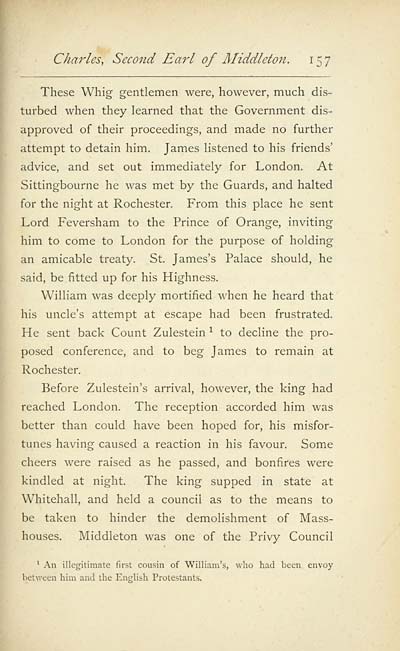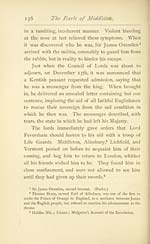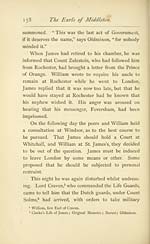Download files
Complete book:
Individual page:
Thumbnail gallery: Grid view | List view

Charles, Second Earl of Middleton. 157
These Whig gentlemen were, however, much dis-
turbed when they learned that the Government dis-
approved of their proceedings, and made no further
attempt to detain him. James listened to his friends'
advice, and set out immediately for London. At
Sittingbourne he was met by the Guards, and halted
for the night at Rochester. From this place he sent
Lord Feversham to the Prince of Orange, inviting
him to come to London for the purpose of holding
an amicable treaty. St. James's Palace should, he
said, be fitted up for his Highness.
William was deeply mortified when he heard that
his uncle's attempt at escape had been frustrated.
He sent back Count Zulestein x to decline the pro-
posed conference, and to beg James to remain at
Rochester.
Before Zulestein's arrival, however, the king had
reached London. The reception accorded him was
better than could have been hoped for, his misfor-
tunes having caused a reaction in his favour. Some
cheers were raised as he passed, and bonfires were
kindled at night. The king supped in state at
Whitehall, and held a council as to the means to
be taken to hinder the demolishment of Mass-
houses. Middleton was one of the Privy Council
1 An illegitimate first cousin of William's, who had been envoy
between him and the English Protestants.
These Whig gentlemen were, however, much dis-
turbed when they learned that the Government dis-
approved of their proceedings, and made no further
attempt to detain him. James listened to his friends'
advice, and set out immediately for London. At
Sittingbourne he was met by the Guards, and halted
for the night at Rochester. From this place he sent
Lord Feversham to the Prince of Orange, inviting
him to come to London for the purpose of holding
an amicable treaty. St. James's Palace should, he
said, be fitted up for his Highness.
William was deeply mortified when he heard that
his uncle's attempt at escape had been frustrated.
He sent back Count Zulestein x to decline the pro-
posed conference, and to beg James to remain at
Rochester.
Before Zulestein's arrival, however, the king had
reached London. The reception accorded him was
better than could have been hoped for, his misfor-
tunes having caused a reaction in his favour. Some
cheers were raised as he passed, and bonfires were
kindled at night. The king supped in state at
Whitehall, and held a council as to the means to
be taken to hinder the demolishment of Mass-
houses. Middleton was one of the Privy Council
1 An illegitimate first cousin of William's, who had been envoy
between him and the English Protestants.
Set display mode to:
![]() Universal Viewer |
Universal Viewer | ![]() Mirador |
Large image | Transcription
Mirador |
Large image | Transcription
Images and transcriptions on this page, including medium image downloads, may be used under the Creative Commons Attribution 4.0 International Licence unless otherwise stated. ![]()
| Histories of Scottish families > Earls of Middleton, Lords of Clermont and of Fettercairn > (173) |
|---|
| Permanent URL | https://digital.nls.uk/95313055 |
|---|
| Description | A selection of almost 400 printed items relating to the history of Scottish families, mostly dating from the 19th and early 20th centuries. Includes memoirs, genealogies and clan histories, with a few produced by emigrant families. The earliest family history goes back to AD 916. |
|---|

